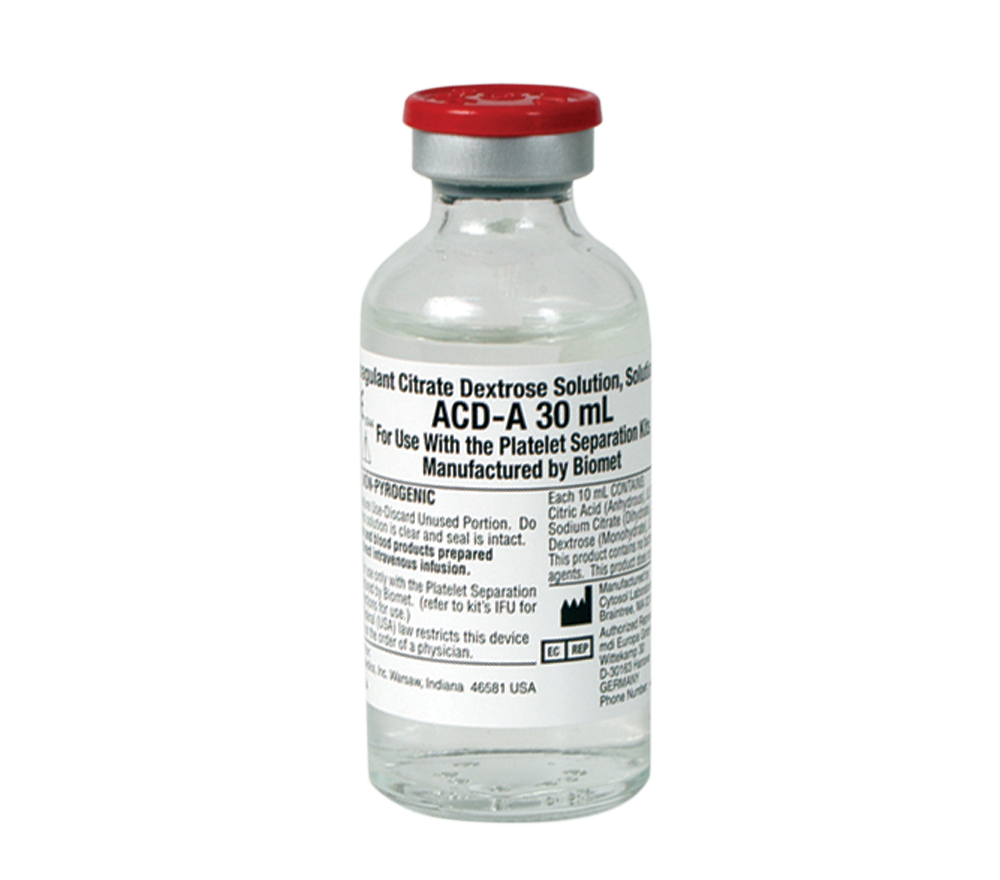triCitrasol® Anticoagulant Sodium Citrate Concentrate
Anticoagulant for Granulocytapheresis Procedures
triCitrasol Anticoagulant Sodium Citrate Concentrate, 46.7% Trisodium Citrate (30.5% free citrate ion), is a sterile, non-pyrogenic solution, used in granulocytapheresis procedures (granulocyte collection by apheresis).
Procedures
- Granulocytapheresis
Philosophies
- Pharmaceuticals
Application
- Multiple
Product Features
Prior to performing granulocytapheresis, 30 mL of the triCitrasol Concentrate is aseptically added to 500 mL of the solution 6% Hydroxyethyl Starch (HES).
The final solution prevents the coagulation of blood by virtue of the citrate ion's ability to chelate ionized calcium present in the blood to form a non-ionized calcium-citrate complex. When the total dose of citrate ions is greater than the total amount of ionized calcium, clotting is prevented.
Benefits
Preventing Clotting
- Final solution prevents coagulation of blood through the citrate ion's ability to chelate ionized calcium present in the blood to form a non-ionized calcium-citrate complex. When total dose of citrate ions is greater than total amount of ionized calcium, clotting is prevented.
FDA Approved
- triCitrasol Concentrate was approved by the US Food & Drug Adminsitration (FDA) in 2003
Important Safety Information
Indications
triCitrasol Concentrate is an anticoagulant used in granulocytapheresis procedures.
Warnings and Contraindications
triCitrasol Concentrate is not for direct intravenous infusion.
triCitrasol Concentrate is a concentrated anticoagulant — dilute prior to use (see full prescribing information).
Adverse reactions
Citrate reactions or toxicity may occur with the infusion of blood products containing citrate anticoagulant. The recipient of the citrated blood product should be monitored for the signs and symptoms of citrate toxicity which can begin with tingling sensations around the mouth or in the extremities, followed by severe reactions characterized by chills, stomach cramps, or pressure in the chest, followed by more severe reactions characterized by hypotension and possible cardiac arrhythmia. Citrate toxicity may occur more frequently in patients that are hypothermic, have impaired liver or renal function, or have low calcium levels because of an underlying disease.
Additional Information
Related Products
Tailored resources for your patients.
Find videos, articles, and interactive content to guide your patients throughout their surgical journey on ReadyPatient.com, our dedicated patient recovery site.
All content herein is protected by copyright, trademarks and other intellectual property rights, as applicable, owned by or licensed to Zimmer Biomet or its affiliates unless otherwise indicated, and must not be redistributed, duplicated or disclosed, in whole or in part, without the express written consent of Zimmer Biomet.
This material is intended for health care professionals. Distribution to any other recipient is prohibited.
For product information, including indications, contraindications, warnings, precautions, potential adverse effects and patient counseling information, see the instructions for use or contact your local representative; search this website for additional product information. To obtain a copy of the current Instructions for Use (IFU) for full prescribing and risk information, please visit labeling.zimmerbiomet.com or call 1-800-348-2759, press 4 for 411 Technical Support.
